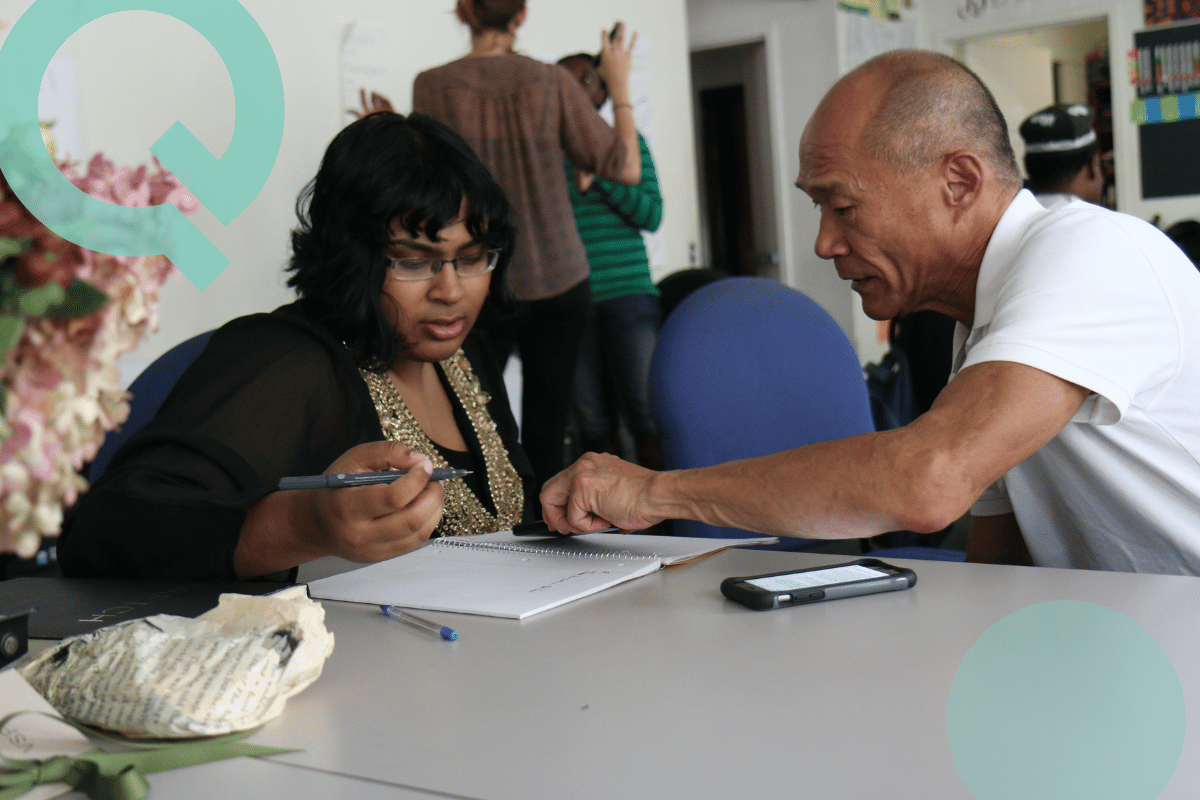Top 10 Mentoring Best Practices for Developing Talent through Mentoring Programs
 Omer Usanmaz
·
7 minute read
Omer Usanmaz
·
7 minute read
Here's a critical question for those starting and running mentoring programs: How do you ensure your mentorship program is effective?
Are there characteristics that define this process? Who needs one, and how do you decide whether your organization needs a mentoring program?
In addition to giving ten best practices for running a mentorship program, these are the questions we'll answer in this piece. By the end of reading this post, you’ll have a better grasp of the mentoring field, its process, and the benefits of mentoring. You’ll also read about who requires these successful mentorship programs.
What Defines the Mentoring Process?
The available research on the mentoring process is quite extensive, and there are plenty of publications on the subject to prove it. For instance, two Harvard Business Reviews speak on the subject, highlighting how it helps both mentee and mentor grow. The other speaks on what effective mentorship looks like.
So, what defines impactful mentoring programs?
Here is a snippet:
- It Involves Strategic Matching
Matchmaking is not an exclusive term in online dating; it is also used in mentoring.
Linking a mentee to the wrong mentor might tarnish the immeasurable positive evidence of mentoring: growth.
Faulty matchmaking leads to poor mentoring experiences and a loss of resources.
An impactful mentoring relationship matches individuals based on goals, interests, backgrounds, complementary skills, and perspectives.
Qooper Mentoring Software uses Smart Algorithm Mentor-Mentee Matching capabilities to match mentoring program participants.
- It Involves Collaboration
Once the matching process is complete, collaboration follows.
This step involves goal setting using the SMART technique.
SMART goals are specific, measurable, relevant, and time-bound. This laser-focused, time-bound approach ensures that the team hits the ground running in their time together.
- It Involves Trust and Clear Communication
Mentors and mentees that trust each other openly communicate and drive positive change. However, this unique relationship does not just magically appear. Both parties have a role to play.
The mentor creates a safe space where the mentee can comfortably ask questions and make comments without feeling judged. They should be active listeners, giving anecdotal feedback with evidence to back them up.
The mentee should also be respectful and stick to the boundaries of the relationship. They should ask relevant questions, follow through on the plan, and speak up wherever needed.
- It Focuses on Learning & Development
Mentorship experts know that the final destination of mentoring is positive growth, regardless of the type of mentoring program.
To peak, the mentoring journey involves unlimited knowledge sharing. The mentor shares their wisdom, experiences, and insights relevant to the program. They also avail access to resources that the mentee can use even after their limited time together.
These help the mentee develop their skills and experience in the relevant fields. They also empower self-discovery, helping the mentee to gain autonomy to find solutions independently in the future.
What Makes a Successful Mentoring Program?
The first query answered what the mentoring journey involves.
This section gives insight into what makes peer or pilot mentoring programs successful.
Those constraints are:
Strategic Matching and Alignment
A mentoring program administrator or software needs impeccable matching capabilities. These programs should match prospective mentees based on goals, personalities, and expertise. However, these factors may differ depending on the form of the mentoring program.
For example, career development programs may use industry experience, career stage, and functional skills to match. Leadership programs may use proven leadership experience and ability to inspire and motivate. Diversity and inclusion programs may use factors like shared background, perspective, and experiences to match. Peer mentoring programs may use shared experiences and complementary skills.
Clear Goal and Expectation Setting
Mentoring formats have clear goals and expectation outlines. A successful mentoring program allows mentors and mentees to define clear, goal-oriented expectations. But it does not stop there!
The program includes ample time slots for each stage with milestones to gauge progress. The mentoring connection then works together phase after phase to reach the goals and meet the expectations.
Support and Training
After setting goals, training and support take center stage. These are meant to equip the team with the needed skills for better collaboration.
Some activities include orientation workshops, guest speaker sessions, and milestone celebrations. Including such collaborative activities in mentoring models helps both mentee and mentor grow together. It strengthens their bond and weighs in on goal-reaching and feedback, promoting further collaboration.
Support mentoring initiatives include alums networking, support groups, and recognition programs. These support systems offer ongoing resources throughout and after the program.
Accountability and Compliance
Training of mentors and mentees is nothing without accountability. A successful mentoring program has measures in place to ensure this.
A mentoring program ensures accountability for mentors and mentees through mentorship program guides and agreements. These explicitly outline the rules and boundaries of the mentee and mentor involvement. It defines modes of communication, times of contact, and other codes of conduct.
They also encourage regularly check in, set up feedback channels, and offer incentives. This way, the mentor-mentee connection operates according to the program’s rules.
10 Best Practices of Mentoring
By understanding the process and what successful programs entail, you are halfway to a successful mentorship. The other half involves the implementation of a few strategies to reinforce the program’s mentoring capacity.
Here are ten best-practice mentoring program practices to help both mentor and mentee:
-
Spark Curiosity
Mentoring experts encourage conversations beyond question and answer. As a team, ignite each other’s minds by engaging in follow-up questions, riddles, counterintuitive anecdotes, and different perspectives. Such relationships begin with the direct effort of mentors who start by creating an open and safe space.
-
Utilize Reverse Mentorship
The best mentoring model is a two-way street. In this arrangement, the mentor and mentee acknowledged that they could learn something from each other. For example, a senior employee career development mentor can learn about the latest technologies in their fields from their mentee. Unlike the downward knowledge exchange, information also flows upwards.
-
Formulate Personalized Challenges
Why not do things uniquely when setting mentee and mentor goals? For example, instead of using generic chef mentee goals of “creating a new recipe daily,” you can suggest “recreate a street dish using locally available ingredients.” Such personalized challenges help the mentee think outside the box and grow a spirit of experimenting.
-
Invite Each Other to Each Other’s Worlds
Do you know the ‘take your child to work day?’ Why not have a take our mentee or mentor to work day? This sparks adventure and betters skill development. Bring them into your world as you work so they can experience first-hand what it’s like to be in your position. Leaders with mentees show them how to run companies, hold meetings, and communicate on the job. You also introduce them to your other relevant professionals, resources, and potential collaborators.
-
Be Honest, Empathetic, Considerate, and Proactive
Let’s be real; sometimes, a mentee or mentor can slack on their job. Perhaps they aren’t prioritizing their active role or fail to reach the milestones. So, what is the best approach? The solution is to start by communicating your concerns and asking about the cause of the delay. Mention how the fallback is affecting your levels of performance and suggest solutions. If they are going through something, be empathetic and considerate and give them space to deal with it. If they cannot keep up their performance, make mentor requests to the mentorship program manager to get reinstated with other preferred mentors.
-
Create a Toolbox
One way to remember and perhaps pass the information you learn forward is to save it. Here, we’ll refer to it as a toolbox. You can include articles, podcasts, inspiring stories, recordings, and links to all this information. You can also include feedback on the topics you’ve saved. Mentors can use these learning resources to teach their future mentorship experiences. Mentees can always refer to this knowledge and share it within their groups.
-
Recognize and Reward Effort
If your mentor wins an award, congratulate them. If your mentee passes an exam or gets a promotion, congratulate them. Since you are each other’s motivation, receiving this recognition will strengthen your bond.
-
Gamify the Mentorship Program
We all enjoy quizzes and strategic challenges, so why not introduce games within the process? You can use points, badges, weekly quests, and virtual and real-world awards for activities completed. A group mentor can use the above to boost employee engagement scores in an official setting. -
Encourage Continuous Learning
Acquiring critical mentoring skills does not end once a program ends. It keeps going. Nonetheless, you set this continuous learning foundation during the in-person sessions. Create a routine for complex and basic knowledge acquisition through research. Define the participant roles and encourage open exchanges to discuss the findings. Share ideas and seek feedback from participants too. Setting the stage with these routines helps the mentor and mentee embrace the new way of gathering and sharing information.
-
Record your Experience
Have fun with it no matter the form of the mentoring program, peer, career or development! Take pictures and videos and write notes to commemorate your mentorship experience. This memorabilia proves that you started and completed something that helped you grow. And you had fun with it!
Why is Mentoring Important?
The essence of mentorship is the value it presents to both parties. New perspectives, lessons, skills, and feedback are valuable resources one leaves with. But that is not all, below are the reasons why mentees and mentors find mentoring essential:
-
Growth
Mentors offer mentees outstanding leadership qualities, career tips, and life lessons that fast-track growth. Mentees equip mentors with feedback they can use to improve their mentoring skills.
These golden snippets help both parties develop personal qualities, such as time, resources, client, and finance management skills. These lessons help everyone involved avoid pitfalls and foster growth in personal and professional journeys.
-
Network Expansion
Both parties celebrate an expanded network after a successful mentee and mentor program. Mentors connect mentees to valuable contacts, which presents opportunities for collaboration and career advancements. Mentees also introduce mentors to new-age platforms they can use for business and personal growth.
-
Renewed Mindset
A mentor’s perspective changes after interacting with mentees with different backgrounds, work experiences, and interests. A mentee also gains the same. The open feedback channels also encourage the thinking-outside-the-box approach based on the information you receive.
These interactions offer new perspectives that can be invaluable during brainstorming sessions and decision-making. They change how you view the world.
Who Needs Mentoring?
Mentor training programs are diverse. They welcome organizations and individuals to participate. The reasons to join one vary, so, here is a list of who can join and for what reason:
-
Newly Hired Individuals
You have a new job and no idea what it entails! Sure, you have the skills, but your experience is at zero!
The good news is that a mentorship program can help by linking a new hire to potential mentors in your field. These individuals will hold your hand and teach you the basics and complexity of the job. They’ll also be instrumental in offering tips on navigating the specific roadblocks in your new career.
-
Individuals Seeking Career Shifts
Do you know you can become a copywriter even after decades of being an engineer?
Career changes are quite common, and a mentor can help.
Here is how:
Connecting with an experienced mentor in the new field can help you transition smoothly. They will give you ways to tailor and incorporate what you already know into your new chosen passion.
For example, prospective writing industry mentors might advise you to explore a niche in writing copy for engineering companies. This way, you can use your knowledge to grow in your new role.
-
Individuals Undergoing Specific Life Phases
Perhaps you just became a parent, promoted, or are a new entrepreneur; mentoring can help.
Prospective mentors can help you overcome performance plateaus and boost your quality of life. Their perspectives and experiences shed light on your situation, helping you better navigate it and emerge a winner.
-
Organizations that Prioritize Growth
In addition to individuals, organizations can offer mentoring programs for their staff. This initiative can focus on leadership, conflict resolution, communication skills, collaboration, and other business matters. By internally or using mentoring software, they can easily spread valuable information throughout the organization. This promotes inclusivity and diversity within the workplace.
Conclusion
Mentorship offers value to everyone involved. However, there are rules to the game:
Understand the process and what makes it successful. Then, implement mentorship best practices and explore their importance.
Qooper Mentoring Software can be your perfect ally. Qooper provides a comprehensive suite of mentorship programs, catering to various needs such as career development, onboarding, student guidance, and intern mentoring. We invite you to schedule a demo to experience firsthand how our solutions can enhance your organization's growth and employee engagement.






